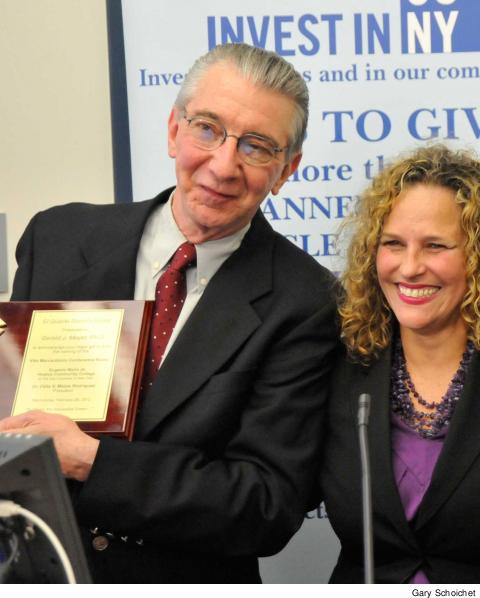Gerald Meyer, PSC hero
 |
Gerald Meyer, who died this past November, was more than just a scholar of New York City radical activism. He lived the values he researched and taught.
Meyer, a historian who became the first PSC chapter chair at Hostos Community College in 1973, is often remembered for his scholarship on left-wing Harlem Congressman Vito Marcantonio and the Italian-American radical community from which he came. But for many in the Hostos community, Meyer is remembered for leading a resistance to CUNY’s plan to shutter Hostos and merge it with Bronx Community College, a plan that was widely seen as an austerity attack on an institution serving the city’s Puerto Rican and Latino communities.
PROGRESSIVE ROOTS
“When in 1975 and 1976, during New York’s fiscal crisis, CUNY administrators repeatedly tried to shut down Hostos Community College, Gerald Meyer took the lead in the fight to save it,” recalled Joshua Freeman, a retired distinguished professor of history at Queens College, who has written extensively about the 1975 financial crisis. “As head of the Faculty Senate’s Save Hostos Committee, Gerry built alliances with students and community groups and helped orchestrate a flood of letters, petitions, demonstrations and lobbying that, along with a campus occupation, ultimately forced CUNY to reverse its decision, a rare victory in a very difficult time.”
An August 2012 Clarion profile of Meyer noted that he “grew up in a poor, working-class family who lived in a series of small towns around Hoboken, New Jersey,” and that “his first act of political protest occurred when he was 15” while attending Catholic school, when he was “confronted by a nun who caught him with a copy of a book by an anti-McCarthy writer and warned the rest of her homeroom class not to speak with Meyer. He threw his books on the floor and walked out of the room, never again to return.”
It went on to say that “Meyer volunteered with the 1956 Adlai Stevenson presidential campaign, spoke out against McCarthyism and collected petition signatures from his fellow students calling for the racial integration of their all-white school.”
“He will indeed be remembered as an incredible organizer, brilliant scholar, dedicated and caring educator and incredible mentor and colleague,” said Lizette Colón, a counselor and former PSC chapter chair at Hostos. “As a historian he was always looking for creative ways to expose his students – and so many of us – to different cultures and countries afar. He ran an international film festival for many years in a small auditorium that we had at the time at our college. He selected every film with so much care and pride, as he knew the kind of impact that he was having in the college community. Hostos exists today in great part thanks to the incredible fight that he led in the 1970s along with so many student and community leaders in the South Bronx community. He became our first PSC chapter chair and he was my beloved mentor. He taught me the importance of building coalitions and relating to all unions and all titles on campus.”
ACTIVIST ACADEMIC
The Gerald J. Meyer Transfer Scholarship at Hostos was established in 2014. He retired from Hostos in 2002, returning in 2004 as an adjunct, and later donated “$25,000 to the college, money that can be used for everything from funding student travel abroad to the school’s lobbying in Albany,” Clarion reported.
Marcella Bencivenni, a professor of history at Hostos, said that Meyer’s legacy goes beyond his successful leadership in the movement to save the institution. “As a dedicated teacher, he spent a large part of his career to advance education for bilingual and poorer, nontraditional students, developing over the years important instructional material and booklets to meet their educational needs,” she said. “He helped establish new college-wide entities such as the Gay and Lesbian Club and the Hostos Solidarity Coalition. After retiring, he cofounded and chaired The Circle of 100 Scholarship and Emergency Fund, which provides emergency grants of up to $500 to students in need and $1,000 scholarships to those transferring to four-year colleges.”
COMMUNITY SOLIDARITY
Anthony Gronowicz, an adjunct professor of history at Borough of Manhattan Community College, said, “Jerry assumed the political persona of Vito Marcantonio, but instead of the East Harlem community, he made the South Bronx’s Hostos Community College with its majority Black and Brown students his educational constituents. When the college was threatened with closure in the 1970s fiscal crisis, there was no one who fought harder on a day-to-day basis to preserve and expand Hostos than Jerry. His biography of Marcantonio stands as a literary legacy for inspiring workers of different ethnic backgrounds to work as one in service to their community.”

